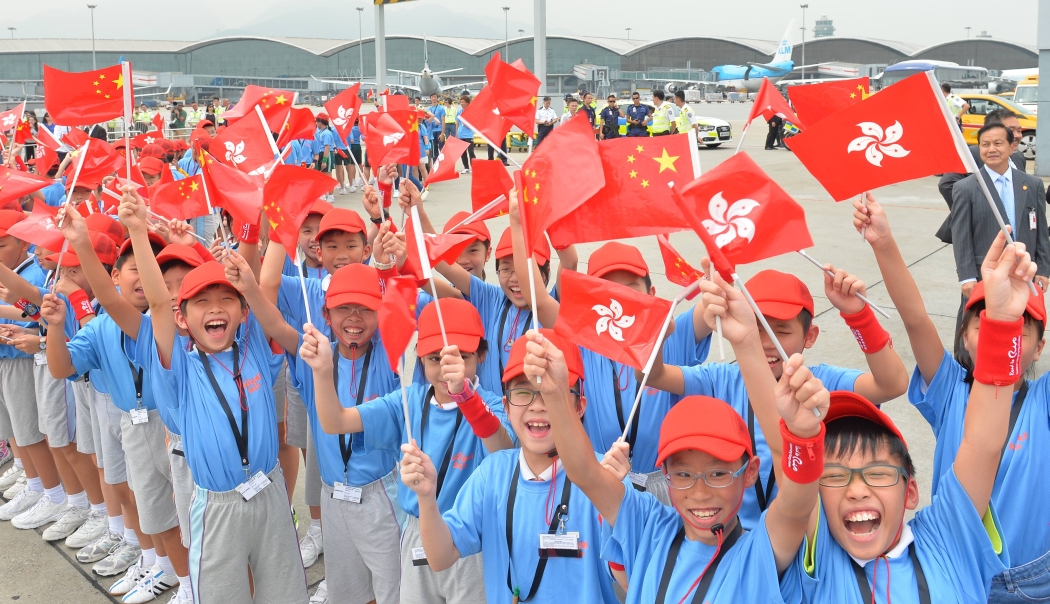I came of age in the first two decades of Hong Kong’s existence as a Special Administrative Region, gaining my social, cultural, and political consciousness as my society struggled to define itself as a unique part of an increasingly powerful mainland China.
Because of my foreign passport as a US-born Hong Kong woman, I had the privilege of emotional distance from many of the tangible political changes since the Handover, including Article 23 in the early 2000s and the universal suffrage debacle more recently. But I am concerned about their implications for the city’s future.

What has deeply impacted me from the start, though, is the increasingly irreconcilable conflict between my own cultural, almost “civilizational” conception of what it means to be Chinese and the overarchingly political one that the mainland imposes on all citizens—including us—as it continues to build a unified nation state out of 1.4 billion culturally, socially and linguistically diverse people.
This conflict is reflected in a recent poll showing how few Hong Kong people, especially young people, identify as “Chinese.” Invariably, in such polls, the choice of “Chinese”— among other options like “Hongkongers” or “Chinese in Hong Kong” — is presented and interpreted as equivalent to being a citizen of the People’s Republic of China, so it is no wonder that the percentage of respondents choosing this is so low.
Like them, I feel overwhelmingly defined by Chinese culture and history. But this pride is apparently not enough, compared with what the mainland expects from me as a new member of its monolithic nation state. Now that Hong Kong is a part of the People’s Republic, “patriotism” should be felt for China as nation and political unit; a love of China as heritage is not enough.
My Chinese identity is rooted in the history, customs, and literary tradition that I share with all other Han Chinese people. But it is also uniquely tied to Hong Kong’s Cantonese culture and complex history, with a divergent developmental trajectory to the mainland. My shared experiences with other Hong Kong people in this sense are by far the most fundamental elements making up my cultural identity.

Cantonese, my native language, underlies my knowledge of the standard written language, so being Chinese for me is as much about understanding Stephen Chow’s untranslatable gags as about reading Confucian classics and training my mind and body through tai chi.
As a descendent of the world’s oldest continuous civilization, I am grateful that one of my second languages, Mandarin, connects me to the diverse populations with the same claim to this heritage. But I struggle—emotionally as well as intellectually—to reconcile the pressure to feel part of the same political entity as someone, whether from Shandong or Sichuan, who has had vastly different experiences from me.
As far as my daily life is concerned, I feel that these differences render our deeper commonalities rather insignificant.
As we enter the third decade since the Handover, I and many other Hong Kong people will continue to navigate these two diverging Chinese identities: the one that comes naturally from the education in Chinese history, literature and culture that we had growing up in Hong Kong, and a top-down one that feels dismissive of our regional experiences.
Nowhere is this conflict better reflected than in the continued fight for the status of Cantonese and the distinct culture mediated in it, as attempts at diminishing its importance in schools and society at large continue. Cantonese, like other Chinese “dialects,” is not mutually intelligible with Mandarin and thus a different language altogether — if we use the most basic linguistic test to differentiate dialects from languages.
While I value the opportunity to interact with other Chinese speakers through a mutual writing system and second language, I will never be ready to abandon my native tongue for the sake of a unified political whole, as I seem to be expected to do now.

This expectation that Hong Kong people adopt a political view of what it means to be Chinese in the 21st century, willingly diminishing the regional, cultural and linguistic traits that differentiate us, is felt at all levels of exchanges between Hong Kong people the mainland, even down to tourist encounters.
Perhaps this explains why Taiwan is now so popular as a travel destination for Hong Kong visitors: as a Chinese society, it does not pressure us to feel a political affinity for it, yet still offers a wealth of culturally intimate experiences.
When I visit, I can get around by speaking a language related to my native tongue, explore a history that I have a firm basis in understanding yet am not completely well-versed in, and eat food that tastes familiar yet differs from my everyday diet. In short, I can appreciate my affiliation with Taiwanese people and engage with them from a common cultural reference point while respecting our distance as separate political entities.
Politically and economically, Hong Kong is becoming more and more a part of China. But if only because of the sheer differences between our experiences and mainland China’s in the 68 years since the founding of the People’s Republic, I hope a more nuanced and layered vision for a “Chinese identity” will be presented to us: one that is not rigidly political, allowing us room to value our cultural affiliations with the mainland while retaining our core regional and linguistic differences.
As it stands now, the narrow definition of “Chinese-ness” we are asked to internalize leaves no room for a differentiation between culture and politics. Reconciling this conflict—if it is at all possible—will continue to weigh on my conception of what it means to be Chinese and a Hong Kong citizen in the years to come.
